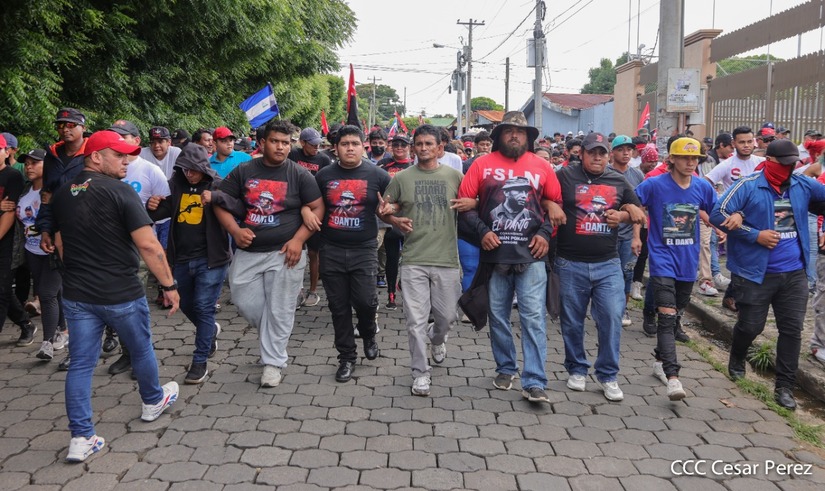On Wednesday, March 23, 2022, accustomed to the monolithic position of the Daniel Ortega regime in international forums, it was new for Nicaraguan State officials to hear the complaint against their bosses from Ambassador Arturo McFields at the permanent session of the Organization of American States. (OAS).
“Defending the indefensible, it’s impossible,” McFields said, as he appealed in his intervention—followed by thousands— the public employees who are forced to feign their approval of the ruling party’s decisions, fill jobs and repeat slogans, while the human rights situation in Nicaragua worsens year after year.
With these words, the former ambassador represented thousands of state workers who have defined themselves as hostages of the tyranny that subjects them to political surveillance, forces them to participate in official activities and even send photographs as evidence when it comes to voting such as the municipal ones of 2022, characterized by the discredit that the execution of an institutionalized fraud in favor of the Sandinista National Liberation Front (FSLN) entails since 2008.
In the days of McFields’ denunciation, some of his colleagues in the government quietly celebrated the address, exchanging glances with others. They tried to avoid exposing themselves in their jobs, since one wrong word could make them future targets for the political commissars of the state bureaucracy. CONFIDENTIAL gave coverage during 2022, at different key moments of national events, to their vision and vehemently expressed their rejection of the measures adopted by Ortega, despite the fear prevailing in the structures of the State.
The control of the FSLN produced tension for months in the institutions. Last September 7, while the Nicaraguan tyranny exhibited the emaciated prisoners of conscience in the courts after 450 days of isolation, the testimony of “María”, published in this newspaper, was moving, in which she assured that “she felt that her heart was breaking it broke him” and she cried when she saw the physical deterioration resulting from captivity, a sadness that was also fueled by the fact that she was forced as a public employee to “live with those demons to avoid problems”.
Many in the Government also joined the global condemnation of the persecution of the Catholic Church, which this year closed with the accusation against Rolando Álvarez, Bishop of Matagalpa and administrator of the Diocese of Estelí for “conspiracy to undermine national integrity.” and “spreading fake news.”
Last October, before the cameras of the magazine Esta Semana, a series of interviews with some workers was recorded: “Alicia”, who occupies a high level of state leadership, and “Sergio” who declared himself inconsistent with the party decisions made internally. of the Judiciary, one of the supports of the Ortega-Murillo dictatorship to continue in the presidential chair.
Precisely, “Alicia” said that support for Ortega is really minimal among his co-workers and confirmed that the persecution against the Catholic Church is unpopular. The uncertainty generated by the attacks that the dictatorship made against the international community also causes discontent, through the expulsion of ambassadors to confirm their self-isolation after the international demand for justice and a return to democracy that the regime has rejected.
“Sergio” revealed instead that there has been a general resignation of officials, dissatisfied with what is happening. In light of this reality, the FSLN’s internal controls have been tightened to the point that Judge Marvin Aguilar, vice president of the Supreme Court of Justice and political secretary of the FSLN in the institution, questions judges even when they ask for permission to take Vacations.
The drama in relation to political prisoners was experienced intensely within the Judiciary, where a select group of judges, prosecutors, and police have complied with the political order to imprison opponents, businessmen, civil society leaders, and university students.
“It is awful. There are co-workers who have political prisoners, there are mothers who are Sandinistas and their children are in prison, and once a week they have to ask permission to go to the prisons to bring them food, “added” Sergio “in the testimony of the.
Within the CSJ, there were also desertions of judges who left in the midst of the crisis. The Orteguismo carried out dismissals and a judicial process began, without the charges against the spokesman Roberto Larios having been disclosed to date. Three advisers to the president of the institution, Magistrate Alba Luz Ramos, were brought to the bench for the same crimes attributed to Bishop Álvarez.
They are Moisés Abraham Astorga Sáenz and the brothers María José and Hans Camacho Chévez, according to information revealed by Yader Morazanexpert in administration of justice.
The complaints in the public sector published for months by the independent media show a photograph of human rights violations committed against officials under the administration of Daniel Ortega, who has been in power for 15 continuous years. But it is a recurring reality since the Somoza dictatorship, as the sociologist Oscar René Vargas recalled in 2018, who today became a political prisoner for the dictatorship. With the caudillo on duty, the workers seem obliged to resist the abuses in silence.
















